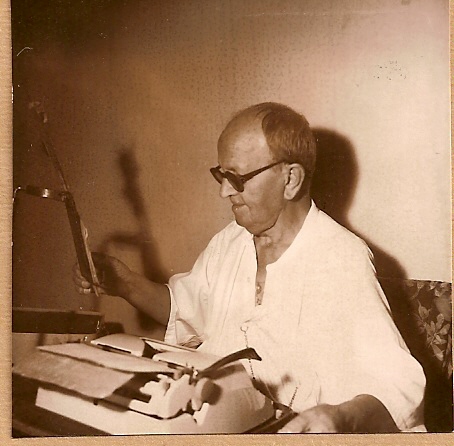Joseph Pasquale Crazzolara, the “Ugandan”-Italian priest, academic and sociologist died today March 25, in 1976. He studied and reported on tribes in northern Uganda and South Sudan and was the grandfather of insight into the Lwo in particular on which he authored several volumes.
So important and towering a figure he was in his field ( ethnologist and linguist) but also left the biggest collections of written history on the early traditions of the Lwo, Lugbara, Ma’adi and other tribes in the era.
His last manuscript was apparently on the small Kebu tribe in West Nile and would no doubt have helped shine light on the identity and origins of this group that has been the subject of much contention in the last decade.
Perhaps because he was not a full time academic but a priest he did not rise to the height of investigators of the period. He appears to have hosted a couple of British luminaries like (later) Sir Evans Pritchard and published his tomes on ethnology and linguistics with the Oxford University press.
His friends and the priestly order he belonged to, the Comboni Missionaries, held prayers to celebrate his life but Ugandans especially from northern parts will be grateful for his works including three volumes on the Lwo.
In particular his efforts to understand the Lwo migration and its impact on other cultures especially via the Luo-Babiito Dynasties is invaluable in understanding the sedimentary rock of contemporary Ugandan society. One time I asked a prominent Acholi politician who headed the caucus of Acholi politicians in parliament whether there was more to the friction between them and the government led by Yoweri Museveni – a tension sometimes defined as North-South divide, and he referred me to the Luo-Babiito era.
“ Museveni ( he claimed) and his people, are jealous that when he travels to the Kingdom of Toro, as a national leader, there is a lot of clapping to help him. When Acholi leaders arrive at the Palace, they have to sound the royal drums” he said from behind his desk. Such modern-day tensions may not come to the public as often, but their historical basis was captured in the tomes written by Fr. Crazzalora who was indefatigable and insatiable in writing and researching.
Unknown to many Ugandan students – the material taught for decades in Secondary Schools on the Luo Migration relied heavily on the work of this Italian who became naturalized as a native son of the soil by immersing himself in the communities where he ministered. Scholars, and readers like me are forever indebted to Joseph P. Crazzalora.
May he rest in Peace.
At his funeral in March 1976 it is said that the Queen of England has sent officials of the Crown to pay respects for his work and life accomplishments, but apparently Italian officials had to scramble to figure out who he was and what he had done.
Below he explains the link between the Lwo word Pak and its association with empako ( names of endearment) used most famously in the Lwo-Babitto people of Toro. Extracted from the Lwo Migration Vol 2 1950.
…………………………………………………………..
“ Gorju (another scholar with a different theory of the origins of the Bachwezi of the Interlacustrine region) gives the twelve names or words which are called ‘m'[}a,ko or numi, characteristic of single families or clans, and now used as terms of endearment or good-luck for children, but which were originally the sacred names of the most famous Bachwezi.
The twelve mpako names have no meaning for the people using them nowadays, he adds, but be records them in the hope that (Some better placed investigators» may be able to check their meaning. He, for one, starts ‘explaining the term amoti, which he connects with the Galla word noting (king). Supposing that moti means king in Galla ( Ethiopian group) and that we have really to do with a Galla word, one should expect amoti to be the proper title for the royal rank, while Gorju expressly, states that akali is the royal mpaco name.
But let us ,examine these words – and the custom they refer to - from the Lwoo -point of view. The verb pako means to praise and the noun “pak”means “honorary title” among the Jii tribes in generai, I believe (2). It is remarkable to find that the custom has survived the bantuization of the groups in question. That this survival establishes a good case in favour of the Lwoo descent of the Bahuma, nohody can deny.
But let us consider the details of the custom.
In the present case the pak (mpako) consists of a single word, a conventional term meaningless to the people now using it, but which may have had a, meaning at the beginning, as the natives think. Among the Acooli the pak consists mostly of an exclamatory phrase, containing the name of the clan or of some supposed ancestor. The single pak words used by the descendants of the Bachwezi (1), as I was able to check myself, are the following:
aboki abwoli acali
adyeri akali akiki
alali amoti apuli
atenyi atwoki bala
These are the names that have been handed down by their ancestors to the Bunyoro people, but which are- no more understood by them. They represent an unknown language. Actually, they are plain Lwoo words. Not that I believe them to represent the original Lwoo form. They are too standardised for that, and I have not found their like amongst the people who have retained the pak custom. We can suppose that a large number of original Pak terms with a corresponding variety of forms, has been gradually reduced to twelve words of one standard only, as the corresponding original language fell into disuse and ceased to be understood.
The pak names as they stand at present, with the exception of the last (Bala), would represent in Acooli a verbal form in the past tense with the pronominal prefix a- of the first person singular (subject, I) and the pronominal suffix -I of the secoond person · singular (object, thee ). I can hardly believe they represented a verbal form in the beginning. They were probably nouns. Anyway, in so far as they represent Acooli words, today they would mean:
aboki: 1 spoke to thee.
abwoli: l deceived thee.
acali: I resembled thee.
adyeri: truly?
akali: in Acooli kaal is the «royal court»; lo-kaal, the members of the royal clan.
akiki: kikiki? adv. densely.
alali: I dispersed thee.
amoti: I greet thee.
apuli (apoli): waterbuck.
atenyi: I abandoned thee.
atwoki: the name of a spirit?
bal-a: my mistake.
ENDS
Picture featured is Crazzolara in Gulu in 1966











A great review of history of the Northern tribes of Uganda. May his soul rest in eternal eternal peace
I have love the article so much. I am glad I read it. I have learnt something I did not know. Thank you Angelo for this wonderful review.
May Fr Pasquale’s soul rest in peace.